- Home
- Getting A New Puppy
- How to choose a dog breed
How To Choose A Dog Breed That Suits Your Family Perfectly!
If you're about to choose a dog breed, don't worry, help is here.
Choosing a dog breed is a big decision to make. If you don't do a little 'leg work' first, it may end in disaster, and you'll have to live with the consequences for a long time, up to 15 years!
Understand the key points to consider before choosing, and be sure to get the right dog breed for you!
Top Tips on How To Choose A Dog Breed!
It is a big decision to bring a dog into your home, so it needs a great deal of forethought.
Just think about the consequences of getting it wrong...you and your family will have to live with that mistake for a long time, between 10 and 15 years or more!
When choosing a dog breed, there are a few key points you might like to consider, so I've set out some of the main points below to help you to narrow your search.
If you've already decided that the Cocker Spaniel is the breed for you (and who wouldn't?), you're on the wrong page; you can skip directly to choosing your Cocker Spaniel puppy.
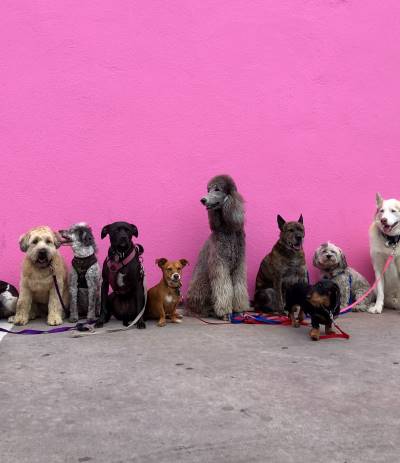 Line up of mixed dog breeds - the usual suspects!
Line up of mixed dog breeds - the usual suspects!What's Motivating You To Buy A Dog?
What is it that's motivating you to get a dog?
Do you want it to work for you, for example, to guard your home, or are you looking for a hunter or a retriever to keep mice at bay?
Do you plan to show your dog, or do you simply want a companion or family pet?
Is having a friendly animal with a good temperament important to you?
For example, Cocker Spaniels and Labradors are typically classed as 'family dogs' because they've excellent temperaments, are very playful, and are willing to please.
Considering the above questions can help you eliminate certain breeds, narrowing your choice to help you choose a dog breed that is just right for you.
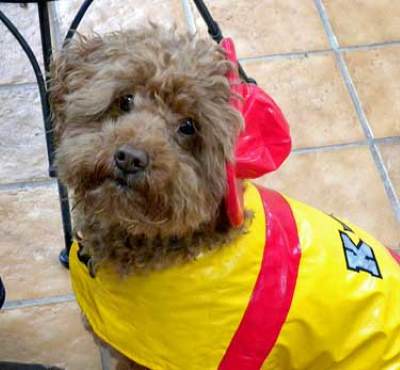 It's going to rain Mum!
It's going to rain Mum!Cute Puppy Kisses And Cuddles Come With An Expensive Price Tag - Can You Afford That?
Owning a dog can be expensive! My goodness, that's an understatement if ever there was one!
So, before choosing a dog breed, be sure you understand what associated costs may be involved, for example:
- The cost of buying the puppy, i.e. the price you pay the breeder;
- A dog crate and a few blankets and bedding;
- An additional soft bed;
- Daily food costs;
- Treats;
- Bare essentials such as a collar, lead, towels, toys, and training treats;
- Vet bills soon mount up and can be very expensive!
- The cost of regular flea and tick treatments and worming tablets;
- Kennel fees to cover holidays or if you become ill and can't take care of your pet;
- Grooming
fees - unless you intend to groom him yourself.
When You're Ready To Choose A Dog Breed, Size Really Does Matter!
What size of pet are you considering: large, standard, small, or miniature?
To begin with, all puppies are small, so it's essential to appreciate just how large your chosen breed will become when it reaches adulthood.
If you've only a tiny garden or live in an apartment, consider one of the smaller to medium dog breeds; however, if you own a house with a garden, your options increase.
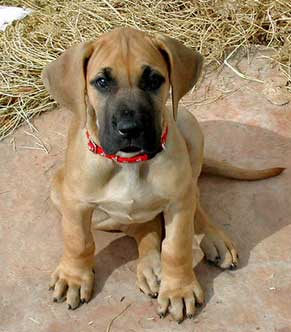 Do you have room for a fully grown Great Dane?
Do you have room for a fully grown Great Dane?Will you need to make any alterations to your home or garden to accommodate your new pet? How much work would be involved in making your premises dog and puppy-proof?
You need to be sure you can afford the costs of making your home suitable.
The size of your home may automatically eliminate some breeds, thus making choosing a dog a little bit easier.
Are You Prepared To Exercise Your Chosen Dog Breed As Much As It Needs?
Before you choose a dog breed, you'll need to be realistic about how much daily exercise each particular breed requires.
Some dog breeds need quite a lot of activity, whereas others don't need so much. With Cocker Spaniels, exercise is essential.
Under-exercised dogs can develop behavioural problems such as barking, chewing, and attention-seeking; such behaviour makes for high-maintenance pets.
All dogs should be walked every day, come rain or shine! Cockers, for example, need a minimum walk lasting at least one hour daily. Think about how much daily walking you are prepared to do or have time for. Do you have the time and the inclination to exercise a dog well?
Are you fit enough to exercise a dog?
Remember, you must commit to these walks for at least 10 years!
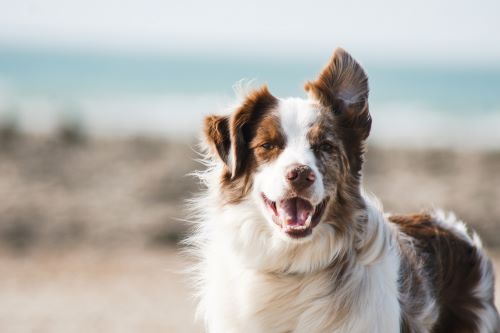 Come on Mum, let's run!
Come on Mum, let's run!Choosing the Ideal Dog Breed for Your Family? Include the Children!
Before you choose a dog breed, it's vital to get the right 'fit' for your family.
For example, a Chihuahua or similar small dog breed wouldn't be suitable for a family with young children as it could quickly become injured by boisterous or over-excited children.
 Hi Mum!
Hi Mum!It's common knowledge that Cocker Spaniels make good family dogs; however, no matter which dog breed you choose, children must learn to behave around a young puppy. They need supervision until you are confident they can be trusted with a dog.
A Labrador, for example, would be a good choice for families with young children as this breed could manage a bit of rough play from the kids!
A small or miniature breed may better suit an elderly couple or an 'apartment' or 'lap' dog.
When choosing a dog breed, consider where you live - suburbs, rural, town, or the city; not all environments are suitable for all dog breeds.
When Choosing a Dog Breed, It's Important To Consider Your Other Pets
If you bring a puppy into the family, it's essential to consider other household pets before choosing your breed.
A hunting dog may be unable to tolerate living around a pet rabbit or guinea pig; small animals such as these may bring out the hunting instincts in, say, a Lurcher or a Greyhound.
Max, my Cocker, has a high prey drive and chases rabbits, cats, and lizards - in fact, anything that moves.
If you have a pet, make sure they're safely locked away. Imagine explaining to the kids that the dog has eaten their pet rabbit!
Choose a dog breed with care and thought, don't get it wrong, or you'll regret it.
Once you decide which breed best suits you and your family, the rest is plain sailing!
When You're Ready To Choose A Dog Breed, Pick One You Can Train Easily
Some dogs are so easy to train; others can be rather strong-willed, making training difficult but never impossible.
A strong-willed breed will require constant ongoing training and reinforcement, especially if your chosen puppy has a particularly dominant personality.
No matter which breed you eventually settle on, you must invest a lot of time and effort in learning how to train your puppy.
How Much Time Do You Have To Devote To Grooming Your Dog?
How much time are you prepared to devote to grooming your dog?
How much grooming a particular dog breed will need depends on the texture and length of the dog's coat. The longer the coat, the more likely it will become tangled and tatty and need lots of regular grooming.
The same goes for a curly, rough-textured coat.
Time spent on grooming can also depend on where you walk your dog.
For example, a Cocker Spaniel that enjoys walks in the countryside will probably need brushing every day (or every other day at the very least) to keep his coat free from burs, seeds, tangles and mats. Although grooming a spaniel can be time-consuming, it's well worth the effort!
But grooming isn't only about brushing your dog's coat; there are many more elements involved, such as bathing, keeping your dog's ears clean and healthy (particularly in dogs with drooping ears, like the Cocker Spaniel), clipping nails, brushing teeth and much more.
Hypo-allergenic Dog Breeds Protect Your Loved Ones from Allergies?
Really?
It's true; hypo-allergenic dogs can protect your family from allergies or asthma. So, if your loved ones suffer from either, choosing the right dog breed will be your priority.
Some dog breeds shed profusely and may aggravate an existing condition, whereas other dog breeds don't shed at all.
Allergy or asthma sufferers would be better suited to one of the hypo-allergenic dog breeds.
Some of those breeds that don't shed include; for example, the Bichon Frise, the Standard Schnauzer, and the Poodle, but there are many more.
Don't Leave Your Beloved Pet Home Alone All Day!
It's not good to leave a dog home alone all day, and puppies should never be left alone for more than one hour - they're too young!
If you have an adult dog and need to leave him for more than a few hours, make sure he's had a long walk first and arrange for a neighbour to look in on him a couple of times during the day to let him into the garden do his toilet and to keep him company for half an hour or so.
If you could afford it, you could arrange for him to go into a kennel as a day boarder, collecting him in the evening after work. At least that way, he'll have the company of other dogs, be able to play, and, more importantly, be supervised.
If you can't be home most of the day, I recommend you re-consider owning a dog until you have more time; otherwise, you may be heading for problems.
Choosing A Dog Breed: Pure Breed Or A Mongrel?
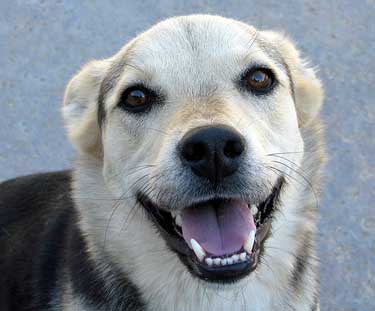 I might be a mongrel but I'm very handsome!
I might be a mongrel but I'm very handsome!Whether you want a pure breed or a mongrel is a matter of choice.
With a pure breed, you can be reasonably sure what you're getting; characteristics, temperament and health problems. Whereas a mongrel's traits and character may be uncertain, especially if you don't know the parents or even the breed(s) of the parents.
Having said that, a pedigree dog is not necessarily a better dog simply because it comes from 'good stock' and costs more; there are many mongrels with a gentle, loving nature whose families wouldn't dream of parting with them!
Do You Want A Cute Little Boy or a Girl Dog?
Do you want a little boy or a girl?
Some owners prefer female dogs because they claim they're quieter and easier to train. Others prefer male dogs because they believe boys can be more affectionate and faithful than female dogs.
A female dog comes into season every 6 months or so. You'll need to guard her fiercely during that time, as all-male dogs will try to mate with her. A male dog can smell a female in heat from a surprisingly long distance!
The female will bleed during her season, meaning your carpets or soft furnishings may need to be cleaned more often.
Males tend to be slightly bigger and stronger and can become a bit of a handful when they reach two years old; they're full of their own self-importance and may need firmer handling.
As there's not too much difference in temperament between the two sexes, it's simply a matter of personal choice!
 I'm watching you!
I'm watching you!Do You Want an Older Dog or a Cute Little Puppy?
Do you want a puppy or an adult dog?
A puppy must be vaccinated, trained to use his crate and potty-trained, and given puppy obedience training to help him grow into a well-mannered adult dog.
A puppy will also need to be socialised, trained to walk on a lead, to walk to heel, and you'll probably need to acclimatise the puppy to being groomed.
On the other hand, an adult pet is more likely to be 'the finished article'.
Although puppies are adorable, they're hard work. You may choose an adult dog because there's less work involved, so why not consider a rescue dog?
Thousands of pets end up in rescue centres every year, mostly because their owners find they can't cope with the care their chosen breed needs or because they've underestimated the cost of owning a dog or the time involved.
Unfortunately, many such rescues are put to sleep long before new homes can be found, so choosing a dog breed should always be taken seriously!
If you choose an older pet instead of a puppy, why not visit your local Cocker Spaniel rescue centre?
Be sure to ask what (if any) behavioural problems the dog may have and seek professional advice to help you overcome them.
It's essential to recognize that not all rescue dogs have behavioural problems. Some end up in rescue centres simply because their owner's circumstances have changed (e.g., moving abroad or ill health), and they can no longer look after their pets.
How To Choose A Dog Breed: Summary
Well, that's about it for this article on how to choose a dog breed. I hope you've enjoyed reading it and that it helps you find the perfect dog for you and your family!
Once you've chosen your ideal dog breed, you might find our page covering how to select the perfect puppy for you and your family very useful.
And when you've found one, remember to visit my page on caring for your puppy to help you give your puppy the best start in life.
Photo credits for How To Choose a Dog Breed:
1. Hannah Lim at https://unsplash.com/photos/U6nlG0Y5sfs
2.Unknown - Unsplash copyright: Great Dane puppy
3. Unknown - Unsplash copyright: Cute dog in yellow raincoat
4. Pauline Loroy at https://unsplash.com/photos/U3aF7hgUSrk
5. Unknown - Unsplash copyright: Mongrel dog
6. Giorgio Trovato at https://unsplash.com/photos/tYksYrLnPL4
7. Charles Deluvio at https://unsplash.com/photos/Mv9hjnEUHR4


